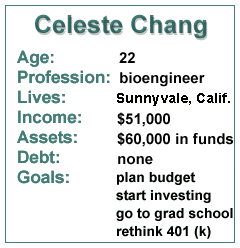|
Bay Area budget blues
|
 |
October 9, 2000: 10:52 a.m. ET
Biochemical engineer and recent grad finds it hard to keep up with dot.comers
By Staff Writer Alex Frew McMillan
|
NEW YORK (CNNfn) - Celeste Chang was fired up when she moved out to San Francisco. She likes the Bay Area -- the people, the weather, the lifestyle, her job. She just doesn't like having to pay for it all.
"When I made the decision to come back out here, I knew the cost of living was going to be high," Chang said. "I guess the reality of it didn't really sink in with me. I hadn't looked hard at my budget, but that's something I'm doing now."
 Chang works as an engineer at Guidant Corp. (GDT: Research, Estimates), helping make stents for heart-disease patients. Chang works as an engineer at Guidant Corp. (GDT: Research, Estimates), helping make stents for heart-disease patients.
After someone with heart problems has balloon angioplasty to clear their arteries, a stent acts like scaffolding to hold back the plaque against the artery walls.
She got into chemical engineering while she was growing up in Gaithersburg, Md. During a high school summer, she had an internship at the U.S. Navy Research Labs that involved detecting chemical vapors. Then she studied Course 10 -- chemical engineering -- at the Massachusetts Institute of Technology.
She graduated this summer and headed to the San Francisco area. She'd already had an internship with Guidant during college, and she had liked the folks there.
Digital-world wealth all too real to her
Many of Chang's friends work for computer-related startups, and they tend to make much more than she does. Chang makes just over $48,000, plus a signing bonus. Some of her friends started on twice her salary.
"That's fine -- I chose my line of work, and I'm happy with my line of work, and I wouldn't want it any other way," she said.
 Still, she admits to occasional pangs of jealousy over the dot.com and startup wealth around her. Still, she admits to occasional pangs of jealousy over the dot.com and startup wealth around her.
"I am very discouraged at the small amount of my paycheck that I'm able to save," she said.
She puts 16 percent of her salary, the maximum allowed, into her 401(k), where she gets a 6 percent match in Guidant stock.
"After other expenses, I barely have enough for long-term savings," she said. Her main goal is to set some money aside so she can return to grad school and get a master's in biomedical engineering.
Checks & Balances runs weekly. People with questions about financial planning are invited to write in explaining their financial goals. See the bottom of this article for specifics.
Chang splits her rent with a roommate, a friend from MIT. Together they pay almost $2,000 a month, which was higher than she expected. But she feels safe in the city she lives in, Sunnyvale, and she's less than 10 miles from work. It only takes 45 minutes to get into San Fran, too -- "with traffic," she chuckled.
She certainly can't afford to buy property, she says, and she doesn't really want to since she's planning on returning to school. "I think moving out is also not an option," she said. "Rents have gone up a little more."
Opening an online account
Chang is very keen on learning more about investing, now she has a salary to invest. She already has a bit of a base. Chang holds $15,000 in the T. Rowe Price Equity Index 500 fund (PREIX) that she saved up from internships over the years. Her father has also given her $45,000 in the Ark Blue Chip Equity fund (ARBCX).
 She figures she'll leave those alone, to draw on it down the line if need be. But she wants to branch away from only holding mutual funds. So she has just opened an account with E*Trade with $1,000. She plunked it in Cisco Systems (CSCO: Research, Estimates) stock. She figures she'll leave those alone, to draw on it down the line if need be. But she wants to branch away from only holding mutual funds. So she has just opened an account with E*Trade with $1,000. She plunked it in Cisco Systems (CSCO: Research, Estimates) stock.
"I am a bit wary of online brokerages," she said. "I know they are most probably safe, but the whole concept of giving an Internet company all my money makes me uncomfortable."
She is also wary of taking her investments into her own hands. When she started her job, she took out books on 401(k)s from the library. She has also read the material Guidant and the plan manager gave her.
"My natural tendency would be to be conservative," she said. "I kind of see investing as a gamble." Still, because she is young, she feels she can afford to have a growth portfolio. Left to her own devices, she feels she'd just stick all her money in an index fund.
Uncomfortable about her 401(k) choice
Instead, she settled for the growth portfolio outlined in the 401(k) literature. But she's bothered by the way it's invested -- to her, it seems to have high exposure in small-company stocks, international stocks and real estate holdings.
"I'm trusting what this booklet recommended for a growth portfolio," she said. But she wants to understand whether it makes sense. "I don't know enough about how international stocks perform, how real-estate stocks perform," she lamented.
 "I know I probably worry a lot," she admitted. Her parents bought her a new Honda Accord for graduation, so she doesn't have those payments. She has a good apartment, friends to hang out with, a decent salary. "I am a very lucky girl!!" "I know I probably worry a lot," she admitted. Her parents bought her a new Honda Accord for graduation, so she doesn't have those payments. She has a good apartment, friends to hang out with, a decent salary. "I am a very lucky girl!!"
But she never has any money left over, and she fears the cost of moving back East if she goes to grad school there. "Living in a location driven by money and stocks and stock options, I am supersensitive to these issues. People have extra money to burn without being so conscious."
How should she invest? How can she save for school? Should she go with an online broker? "Please help me sort through all this confusion ..."
What the planners say:
"I see lots of emotion in her financial decisions," said Phil Cook, a certified financial planner in the Los Angeles suburb of Torrance, Calif. "This will hurt her in the long run."
Emotional decisions are often very short term, Cook explains, and not based on what you really feel or need long term.
Cook recommends that Chang write down her goals, such as saving money to go back to grad school. He advises her to look at them several times a day. Committing ideas to paper will help make her goals more concrete, he said.
Click this link to read last week's Checks & Balances column.
Click the following link to read last week's Portfolio Rx, a column that runs every Tuesday in CNNfn's Retirement section. Each article reviews an investor's long-term portfolio, using financial experts to offer advice.
It will also help her identify her goals. The only hard-and-fast financial goal Cook sees is planning for grad school. Writing them down will force her to make choices and start planning.
"With her goal or goals committed to paper, she can begin to work backwards. That is, now she can write down what her goal will cost and then write down what she has to do to be able to pay for it."
Justifying expenses to herself
James Demmert and Tamra Stern, financial advisers with Main Street Research in Sausalito, Calif., also took a look at Chang's finances. Stern agrees that Chang seems confused about her priorities and her spending.
For instance, Chang contradicts herself when she talks about her finances. She decries the high standard of living in the Bay Area and feels she has to live on a tight budget. But, elsewhere, she admits she is "living pretty comfortably."
Both planners hone in on her comment that she has "no problems" spending $500 on a plane ticket back to the East Coast "several times a year" to see her family. Cook says it sounds like she is justifying the trips to herself.
"This emotional justification allows her to mentally feel better about doing something she knows does not jibe with what she wants long term," Cook said.
Chang spends $90 on phone bills each month, much of it from talking to her boyfriend in Boston and her family, and she likes being generous spending on her friends. The planners warn her to work out whether this meshes with what she wants to accomplish.
"She needs to decide if this carefree spending takes priority over saving for her master's program and saving for herself or her future," Stern advised.
A paper budget and a paycheck review
The next step after writing down her goals is to develop a budget on paper, Cook advised. If Chang breaks out her monthly expenses, she can identify where to cut back -- particularly if she knows how much she has to cut back.
Both planners think Chang needs to look at her paycheck a little more closely. She says that taxes take up 50 percent of her gross income. But the planners point out she is only in the 28 percent federal tax bracket.
State taxes might take another bite. But after deductions, she's still only seeing around a third of her pay go to the government, Cook says. She might take home half her check after 401(k) deductions, health insurance and the like. But those aren't income taxes.
"I'm not saying this is good, but it is more accurate and provides a clearer picture of what's going on," Cook said.
Stern agrees she should make sure she understands her deductions. The planner thinks Chang should reconsider her E*Trade account and open one at a brokerage with branches, such as Charles Schwab or Merrill Lynch, instead.
She could still get online access, as well as access to educational materials. But she would be able to stop in at an office and get face-to-face advice to help her understand her pay and her retirement plans. That, Stern says, might allay her fears about investing.
Can she stay with her 401(k)?
As far as the cost of college goes, Stern points out that Guidant may be willing to pay all or part of her tuition. Since she's worried about the cost of moving back East, maybe she should consider staying on with Guidant and looking for grad schools on the West Coast, the planner says.
If she is serious about returning to the East Coast soon, she might want to stop making 401(k) contributions and instead save that cash into a money-market account, Stern says.
Click here to review your mutual-fund portfolio with CNNfn.com's Morningstar tools.
Click here to go to CNNfn.com's 401 (k) and pension-plan page.
There's a choice -- if she can study for her degree while still working with Guidant, she should continue her retirement-plan contributions and perhaps get support for books and so on. She'd also save on her moving expenses.
If she sticks with the company, Stern says she might want to think about taking her 401(k) entirely in Guidant stock at the moment. Guidant has a good track record, above-average growth, and medical products companies tend to weather economic downturns, Stern says.
She has recommended a similar approach for employees at JDS Uniphase (JDSU: Research, Estimates) and Charles Schwab (SCH: Research, Estimates). "I certainly wouldn't recommend it for everyone," she explains. But at the moment, Guidant is above average enough that it's worth it, she said.
Cook completely contradicts that advice, while admitting Chang ought to retool her portfolio. She is keen to get into investing in individual stocks, but that's not really appropriate for her, he says.
Index fund instinct isn't a bad approach
Her inclination to lean toward an index fund is not a bad one, according to Cook -- as long as she selects a few index funds that represent different segments, such as large, medium and small caps, and styles, with a mix of growth and value. Her 401(k) is actually pretty well diversified that way, he points out.
Mainly, though, Cook said, she needs to reconsider her approach to money. She should think of it clinically, like she likely thinks of chemicals, he said: "If you add this chemical to that chemical, you will get this result."
With school and a tight budget in mind, her approach to money "will be her biggest obstacle," Cook said. "She really needs to ignore to the extent possible the perceived money everyone around her is making."
* Disclaimer
Got questions about financial planning? Need some advice? CNNfn.com has organized a panel of outside experts to answer your questions. If you want to be considered for the "Checks & Balances" column, where professional planners suggest ways you can manage your money, send us an e-mail at checksandbalances@cnnfn.com. For those selected, financial planners will review the details and suggest ways to meet those goals.
Include information about your age, occupation, income, assets and monthly expenses -- imagine you're providing a full income statement and balance sheet. Also, share with us any short-term and long-term financial goals you may have. And don't forget to leave your phone number. 
|
|
|
|
|
 |

|

